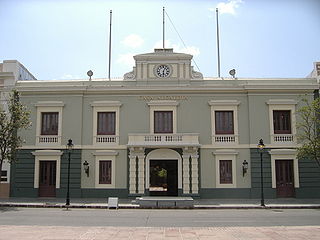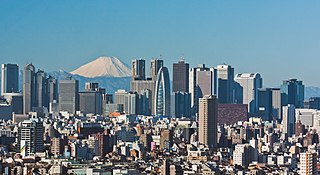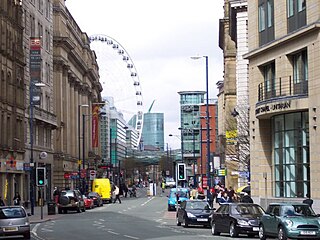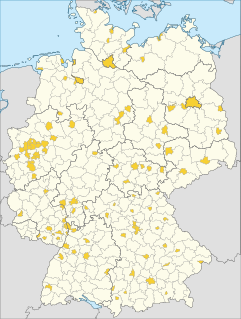
A municipality is usually a single administrative division having corporate status and powers of self-government or jurisdiction as granted by national and regional laws to which it is subordinate.

A train is a form of rail transport consisting of a series of connected vehicles that generally run along a railroad track to transport passengers or cargo. The word "train" comes from the Old French trahiner, derived from the Latin trahere meaning "to pull" or "to draw".

A postal code is a series of letters or digits or both, sometimes including spaces or punctuation, included in a postal address for the purpose of sorting mail.

A town is a human settlement. Towns are generally larger than villages and smaller than cities, though the criteria to distinguish between them vary considerably in different parts of the world.

LGBT or GLBT is an initialism that stands for lesbian, gay, bisexual, and transgender. In use since the 1990s, the term is an adaptation of the initialism LGB, which began to replace the term gay in reference to the broader LGBT community beginning in the mid-to-late 1980s. The initialism, as well as some of its common variants, functions as an umbrella term for sexuality and gender identity.

A township is some kind of human settlement or administrative subdivision, with its meaning varying in different countries.
In many countries, a mayor is the highest-ranking official in a municipal government such as that of a city or a town. Worldwide, there is a wide variance in local laws and customs regarding the powers and responsibilities of a mayor as well as the means by which a mayor is elected or otherwise mandated. Depending on the system chosen, a mayor may be the chief executive officer of the municipal government, may simply chair a multi-member governing body with little or no independent power, or may play a solely ceremonial role. A mayor's duties and responsibilities may be to control municipal workers, provide basic governmental services to constituents, and execute the laws and ordinances passed by a municipal governing body. Options for selection of a mayor include direct election by the public, or selection by an elected governing council or board.
A federal district is a kind of administrative division of a federation, usually under the direct control of a federal government and organized sometimes with a single municipal body. Federal districts often include capital districts, and they exist in various federations worldwide.

Pansexuality is sexual, romantic, or emotional attraction towards people regardless of their sex or gender identity. Pansexual people may refer to themselves as gender-blind, asserting that gender and sex are not determining factors in their romantic or sexual attraction to others.
An alderman is a member of a municipal assembly or council in many jurisdictions founded upon English law. The term may be titular, denoting a high-ranking member of a borough or county council, a council member chosen by the elected members themselves rather than by popular vote, or a council member elected by voters.

A city centre is the commercial, cultural and often the historical, political, and geographic heart of a city, especially those in the Western world. The term "city centre" is primarily used in British English and Canadian English, and closely equivalent terms exist in other languages, such as "centre-ville" in French, Stadtzentrum in German, or shìzhōngxīn (市中心) in Chinese. In the United States, the term "downtown" is generally used, though a few cities, like Philadelphia, use the term "Center City", while others such as Portland use the term “City Center”.

The term inner city has been used, especially in the United States, as a euphemism for lower-income residential districts that often refer to run down neighbourhoods, in a downtown or city centre area. Sociologists sometimes turn the euphemism into a formal designation by applying the term inner city to such residential areas, rather than to more geographically central commercial districts.
Barrio is a Spanish word that means "quarter" or "neighbourhood". In the modern Spanish language, it is generally defined as each area of a city, usually differentiated by functional, social, architectural or morphological features. In Spain, several Latin American countries and the Philippines, the term may also be used to officially denote a division of a municipality. Barrio is an arabism.

In all German states, except for the three city states, the primary administrative subdivision higher than a Gemeinde (Municipality) is the Landkreis or Kreis. Most major cities in Germany are not part of any Kreis, but instead combine the functions of a municipality and a Kreis; such a city is referred to as a kreisfreie Stadt or Stadtkreis.

A sister city, or twin town, relationship is a form of legal or social agreement between two geographically and politically distinct localities for the purpose of promoting cultural and commercial ties.
An urban area or tätort in Sweden has a minimum of 200 inhabitants and may be a city, town or larger village. It is a purely statistical concept, not defined by any municipal or county boundaries. Larger urban areas synonymous with cities or towns for statistical purposes have a minimum of 10,000 inhabitants. The same statistical definition is also used for urban areas in the other Nordic countries.
An endonym is a common, internal name for a geographical place, group of people, or a language/dialect, meaning that it is used inside that particular place, group, or linguistic community in question; it is their self-designated name for themselves, their homeland, or their language.

The New York City Council is the lawmaking body of New York City. It has 51 members from 51 council districts throughout the five boroughs.

In geography, statistics and archaeology, a settlement, locality or populated place is a community in which people live. The complexity of a settlement can range from a small number of dwellings grouped together to the largest of cities with surrounding urbanized areas. Settlements may include hamlets, villages, towns and cities. A settlement may have known historical properties such as the date or era in which it was first settled, or first settled by particular people.
Suburbs and localities are the names of geographic subdivisions in Australia, used mainly for address purposes. The term locality is used in rural areas, while the term suburb is used in urban areas. Australian postcodes closely align with the boundaries of localities and suburbs.











